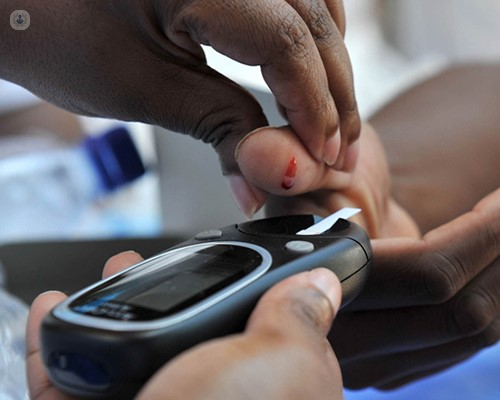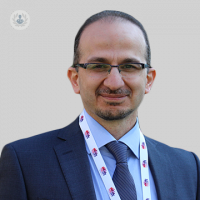Can obesity gastric surgery cure diabetes?
Escrito por:Diabetes is the epidemic of the century. Type 2 diabetes is related to obesity and cases in the UK and worldwide have quadrupled over the past 30 years. In the UK alone, more than 2 million people are affected with more than 10% of UK health spending being directed to diabetes treatment. This increase in type 2 diabetes is mainly related to the obesity pandemic. Currently there is no specific cure for type 2 diabetes, just management techniques. Unfortunately, for many patients, within a few years of being diabetic, they develop life threatening complications such as heart attacks, strokes, hypertension, peripheral vascular disease, blindness and kidney failure. Hence, finding a better solution for type 2 diabetes is important.
Mr Ali Alhamdani, a leading bariatric surgeon and leader in revolutionising the way we treat diabetes with surgery, explains how we can rethink the treatment of this disease.


How can surgery help cure type two diabetes?
There was a report in the Lancet in 1925 which suggested that a side effect of an operation to treat peptic ulcer disease (an early version of what we now call a gastric bypass) was the remission of diabetes in diabetic patients. They found this by testing glucose levels in their urine, which was one of the early ways to diagnose diabetes. This observation was seen more frequently in the 1980s and in 1990 when obesity surgery was offered to obese patient with diabetes.
Gastric bypass surgery is essentially the last resort to treat obese patients. This operation consists of dividing the stomach into two parts – the small, top part and the remaining lower, large part – and then connecting the top part of the stomach to the small bowel after bypassing 1-2 meters of the small bowel. Recent evidence showed that this type of surgery can control or cure diabetes.
An increasing amount of evidence from the literature now favours the effect of surgery on type 2 diabetes in comparison to other modalities of treatment like medications, diet and exercise. Evidence shows that obesity surgery attacks the symptoms, in addition to the cause of diabetes. Diabetic patients after surgery have their blood sugar normalised within just a few months. They also have less chance of developing diabetic complications like blindness and heart disease. Surgery also helps to reduce high blood pressure and lower high cholesterol levels.
Why does surgery have this effect?
The exact mechanism of why diabetes is controlled after obesity surgery if not fully understood. A few theories suggest that after the gastric bypass, when food reaches the lining of the small bowel, increasing amounts of gut hormones are excreted which results in increased production of insulin and hence the control of diabetes. Medical insulin after obesity surgery is stopped on day one, even before the patient starts to lose weight, because of the strong hormonal effect of surgery to control this chronic condition.
What are the benefits of treating diabetes with surgery?
Other than the health benefits and diabetes remission for patients, studies have shown the economical benefits. It is suggested that the cost of the surgery, which is around £10,000-£12,000, will be gained after 2-3 years due to the reduced spending on diabetic medical treatment.
The UK National Bariatric Surgery Registry (NBSR), which conducts a continuous auditing process of the result of obesity surgery in the UK, showed that diabetic people who received surgery had a 75-80% chance of diabetes remission. In addition, the National Institute of Health and Clinical Excellence in UK (NICE) has recently approved obesity surgery to treat diabetic patients with a BMI of 30 and above.
Are there any setbacks for this new treatment?
There are a few obstacles in view of providing surgery to treat diabetes on a nation-wide scale. One of those obstacles is the high cost of the surgery, however, as already stated this has been shown to be made back in due course. The second obstacle is the prejudice the community has for obese patients, with many holding the belief that these patients bring poor health onto themselves by not following a healthy diet.
I believe it is a time to think differently about diabetes. Type 2 diabetes is a disease that is related to obesity and can be cured, or at least controlled with surgery. When patients know that this is a curable disease, with the last option being surgery, then that might give hope to patients, making them more determined to try the treatment ladder from the start of medical treatment and lifestyle changes and up to surgery if required. Changing the perception of diabetes from a picture of an untreatable disease to a problem that can be solved by surgery is difficult to imagine but as Albert Einstein said once “imagination is more important than knowledge”.
If you are interested in finding out more, make an appointment with an expert.



